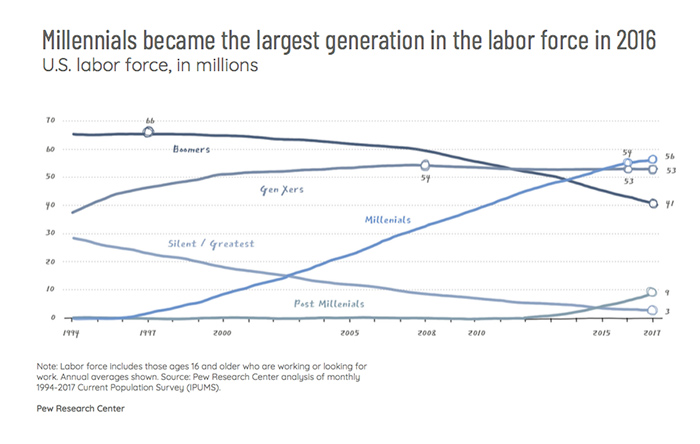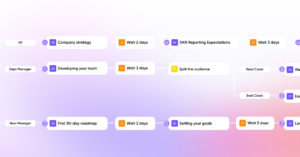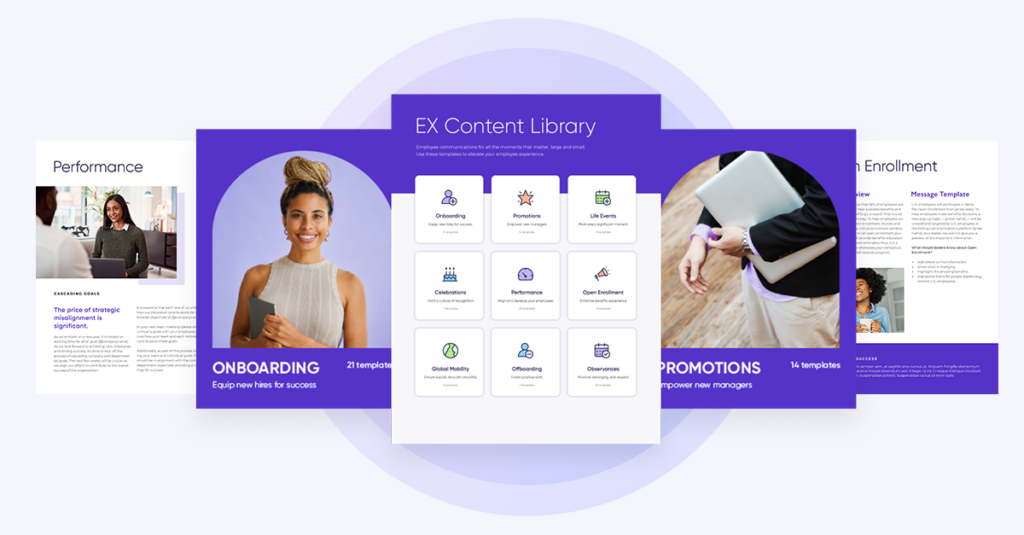That claim about Millennials was made by the U.S. Chamber of Commerce Foundation . . . way back in 2012. According to U.S. Census Bureau statistics, there are plenty of them to study, 80 million-plus (the largest cohort size in history).
Since then, the cottage industry of researchers analyzing everything about Millennials has only grown. It’s a subject that has launched reports, books, and infographics on how these younger Americans are different (or maybe not so different) from previous generations.
Either way, Millennials are unquestionably a societal force.
“In nearly every corner of the U.S., business executives, community and civic leaders, marketers, and managers are talking about Millennials and their behaviors, attitudes, and beliefs,” according to Gallup’s “How Millennials Want to Work and Live.” “They want to understand how this generation is similar to and how they differ from their predecessors, as well as how to apply this knowledge to create more engaged employees and consumers and healthier, happier citizens.”
That on-the-job component is especially interesting. So, we’ve brought together some of the leading research on Millennials in the workplace to help you understand the profound impact they’re having in organizations today.
Who are the Millennials
It depends on who you’re asking. The age range varies. But the Pew Research Center defines Millennials as the people who were born between 1981 and 1996. And Gallup, which uses roughly the same time window, estimates that there are approximately 73 million Millennials in America.
Millennials already are the largest segment in the workplace. By 2025, 75 percent of the global workforce is expected to be made up of Millennials.

Gallup research on Millennial engagement
“Millennials are first-generation digital natives who feel at home on the Internet,” concluded the guide “How Millennials Want to Work and Live.” “Technology – particularly gadgets like smartphones, but also tablets and laptops – have revolutionized the way they connect and interact with one another and the rest of the world. While the vast majority of Americans surf the Web from a desktop or laptop computer at home or work, 85 percent of Millennials access the Internet from their phones – more than all other generations.”
- Millennials are the least engaged generation in the workforce. Only 30 percent are engaged while 55 percent are not engaged, and 15 percent are actively disengaged.
- They change jobs more often than other generations. About 21 percent of Millennials report switching jobs within the last year, and 62 percent are open to a different opportunity.
- Millennial turnover costs the U.S. economy an estimated $30.5 billion annually.
- 44 percent of Millennials say they are more likely to be engaged when their manager holds regular meetings with them. But only 21 percent of Millennials meet with their manager on a weekly basis.
- While half of Millennials say they feel good about the amount of money they have to spend, less than 40 percent are what Gallup defines as “thriving” in any one aspect of well-being.

Deloitte research on Millennial values
“While your workers believe that business should consider stakeholders’ interests as well as profits, their experience is of employers prioritizing the bottom line above workers, society and the environment, leaving them with little sense of loyalty,” according to “The 2021 Deloitte Millennial Survey.”
- Only 48 percent of respondents in a survey of 10,500 people believe corporations behave ethically, a decline from 65 percent> in 2017
- Just 47 percent think business leaders are committed to helping society improve, down from >62 percent a year earlier.
- A majority of Millennials across the world agree with the statement that businesses “have no ambition beyond wanting to make money.”
- 69 percent of employees who believe their senior management teams are diverse see their working environments as motivating and stimulating versus 43 percent who don’t perceive leadership as diverse.
- >43 percent of Millennials envision leaving their jobs within two years while only 28 percent seek to stay beyond five years. The 15-point gap was a seven-point increase from the previous year.
Gartner research on Millennials and technology
“Millennials are more likely to use higher-end technologies in their personal lives, so it’s no surprise that they have a more positive view of IT strategies that encourage the use of personal devices at work,” according to the “Millennial Digital Workers Really Do Differ from Their Elders” report.
- 38 percent of Millennials surveyed say they have the “latest and greatest” personal devices compared to 25 percent of Baby Boomers.
- When asked how they would prefer to schedule their work time, Millennials said they would spend the least amount of time in the office <(53 percent) when compared to Gen X (56 percent), and Baby Boomers (63 percent).
- 53 percent of Millennials not in IT departments said one of their first three ways to solve a digital technology issue would be to look for an answer on the Internet. That dropped to 41 percent with non-Millennials.
- 42 percent of Millennials use real-time messaging at work, 42 percent use social media and 32 percent use storage or sharing applications.
Great place to work research on Millennials and loyalty
“The Best Workplaces for Millennials give employees the tools they need to succeed,” wrote CEO Michael Bush. “They set the bar for other organizations seeking to retain and develop the next generation of leaders and prove that giving Millennials jobs with purpose and meaning drives them to give their best at work, benefitting the company as a whole.”
- When Millennials believe their company has a high-trust culture, they’re >22 times more likely to want to work there for a long time. (In comparison, Gen Xers are 16 times more likely to want to stay, and Baby Boomers are 13 times> more likely.)
- 88 percent of younger employees say they plan to stay long-term at businesses considered “Best Workplaces for Millennials.”
- Millennials who say they have a great workplace are 59 times more likely to strongly endorse their company to friends and family.
- At companies where managers show sincere interest in Millennials as people, the organization sees an 8x improvement in agility, and a 7x increase in innovation.
ManpowerGroup research on Millennials and careers
“A Millennial mindset around careers is emerging,” was one conclusion from “Millennial Careers: 2020 Vision.” “Like long-distance runners, this work-hard, play-hard generation have their eyes on the horizon and what’s next. They are planning for the long haul and want work that increases their long-term employability.”
- >33 percent of Millennials in the U.S. expect to retire between the ages of 65 and 69 while 23 percent think they will retire between 60 and 64. 12 percent say they expect to work until they die.
- 73 percent report working more than 40 hours a week and nearly a quarter work more than 50 hours a week.
- The top priorities when looking for a job are money (92 percent), security (87 percent), holidays/time off (86 percent), great people (80 percent), and flexible working (79 percent).
- When asked what the “right” amount of time is to stay in a single role before being promoted or moving to another, about two-thirds said less than two years and a quarter said less than 12 months.
- Only 3 percent of Millennials work in the gig economy.
Communicating with Millenials, with Malcolm Gladwell
With new generations entering the workforce organizations need to embrace a network model that empowers every employee. Listen to Malcolm’s keynote session from Attune Digital Employee Experience Summit.











